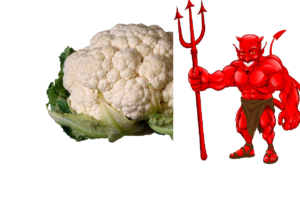I’m sitting in a café, trying to mark exams (and stop procrastinating) and the ladies opposite me are having a fairly public and loud “nutrition consult”. One is paying the other for her advice and is listening intently. I promise I am trying hard not to listen… but it is so loud… and so….. interesting:
Client: So that is why my knees are giving me so much trouble? Because of my diet?
“Nutrition” lady: Absolutely – your diet is so inflammatory, it is 100% causing your knees to get sore and probably also causing all sorts of other problems – heart problems, digestive problems…..
Client: ooooooooooohhhhhh. Woooooooooow!
“Nutrition” lady: you need to eat more Kale, melon, spinach, beans. But NEVER eat raw broccoli and avoid pumpkin and cooked cauliflower – you can eat it raw but never cooked. Eat blueberries and raspberries but NEVER strawberries – those babies are so bad for you……………… And it all must be organic…..
On and on it went. The client left a little bewildered with a strange and random list, heading home via the organic shop to infuriate her family, friends and facebook friends with her new nonsense diet that was going to cure her knee pain and toxic liver.
Now can you see why I couldn’t concentrate?
The “why” behind our pain can tend to drive us to do some strange things – it is a big component of “the search” for the quick and easy answer to our pain. If we can just find out the why, then we can do something about it and there is our answer. Hooray!!!!! If only it was that easy.
Looking for answers seems to be part of our culture – we are quick to blame, rather than attend to the problem in front of us. My own example of this is my tension headaches – they come on occasionally, perhaps a couple of times a year, usually when I am burning the candle at both ends. They tend to last a week or so and they suck! They are a good empathy check for me to help deal with patients in pain. My natural tendency is to go looking for a specific reason as to why they might have popped up this time – is it lack of sleep, stress, too much work on etc. Sometimes, I just can’t pin down a reason at all and I find this situation the most distressing – if I can’t even figure out what I have done to bring them on, how do I stop it from coming on again? The desire to be in control in all aspects of my life is obviously a dominant one! I have begun to reason with myself that perhaps I can’t be in control of these things – and that is OK! I can generally keep doing what I need to do WITH a headache and I know it will go away in the near future.
Disengaging the patient away from looking for the “why” is a massive part of pain education. Its also often the hardest part to shift – people have usually latched onto a “why” that may be incorrect but has meaning or makes sense to them. They will often have fitted it into a rule type situation that looks like this:
When I _____________________________, ____________________________ happens.
For example,
When I eat cooked cauliflower, my knees get really sore
These are often incorrect and unhelpful understandings about a person’s individual situation. Myth busting in these cases is an important part of pain education. How we go about that is probably going to be the key to success or failure. For example, laughing until you fall on the floor about the cauliflower probably isn’t going to work well as a rapport building exercise. We need to remember that the desire to know why can be a powerful driver and disentangling that needs to be done delicately. We also need to recognise that if we take away someone’s long held assumptions, we need to replace it with something that is accurate, tangible, reassuring and helps them to look forward towards function, rather than keep looking for answers. This is the essence of good pain education.

